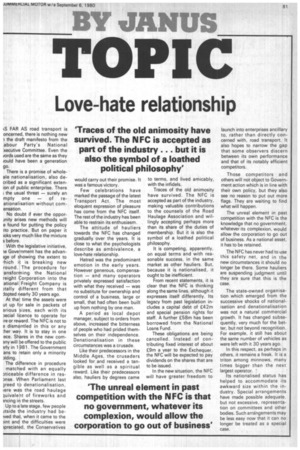Love-hate relationship
Page 83

If you've noticed an error in this article please click here to report it so we can fix it.
'Traces of the old animosity have survived. The NFC is accepted as part of the industry . . . but it is also the symbol of a loathed political philosophy'
1/45 FAR AS road transport is :oncerned, there is nothing new a the draft manifesto from the .abour Party's National :xecutive Committee. Even the ;fords used are the same as they rould have been a generation go.
There is a promise of wholeale nationalisation, also decribed as a significant extenion of public enterprise. There ; the usual threat — surely an mpty one — of reationalisation without cornensation.
No doubt if ever the opporJnity arises new methods will e found for putting the policy to practice. But on paper it )oks very much like the mixture s before.
With the legislative initiative, le Government has the advanige of howing the extent to fhich it is breaking new round. The procedure for .ansfor ing the National reight Corporation into the ational Freight Company is >tally different from that Rioted nearly 30 years ago.
At tha-: time the assets were Lit up for sale in packets of arious sizes, each with its aecial licence to operate for ire or reward. The NFC is not to e dismantled in this or any :her wav. It is to stay in one ece. Shares in the new corn3ny will be offered to the public Irly in 1981. The Government ans to retain only a minority aiding.
The difference in procedure matched with an equally aticeable difference in resarise. When Parliament last 3reed tp denationalisation, iere was the road haulage luivalent of fireworks and mcing in the streets.
Up to a late stage, few people itside the industry had be ived that, when it came to the )int and the difficulties were )preciated, the Conservatives would carry out their promise. It was a famous victory.
Few celebrations have marked the passage of the latest Transport Act. The most eloquent expression of pleasure has come from the NEC itself. The rest of the industry has been able to restrain its enthusiasm.
The attitude of hauliers towards the NFC has changed gradually. over the years. It is close to what the psychologists describe as ambivalence, a love-hate relationship.
Hatred was the predominant emotion in the early years. However generous, compensation — and many operators privately expressed satisfaction with what they received — was no substitute for ownership and control of a business, large or small, that had often been built up from nothing by one man.
A period as local depot manager, subject to orders from above, increased the bitterness of people who had prided themselves on their independence. Denationalisation in these circumstances was a crusade.
Like their predecessors in the Middle Ages, the crusaders looked for and received a tangible as well as a spiritual reward. Like their predecessors also, hauliers by degrees came to terms, and lived amicably, with the infidels.
Traces of the old animosity have survived. The NEC is accepted as part of the industry, making valuable contributions to the counsels of the Road Haulage Association and willingly accepting perhaps more than its share of the duties of membership. But it is also the symbol of a loathed political philosophy.
It is competing, apparently, on equal terms and with rea sonable success, in the same market as other hauliers. But, because it is nationalised, it ought to be inefficient.
From recent statements, it is clear that the NFC is thinking along the same lines, although it expresses itself differently. Its legacy from past legislation in cludes a capital debt of £42m and special pension rights for staff. A further £58m has been borrowed from the National Loans Fund.
These obligations are being cancelled. Instead of contributing fixed interest of about £9m a year to the Exchequer, the NEC will be expected to pay dividends on the shares that are to be issued.
In the new situation, the NFC will have greater freedom to launch into enterprises ancillary to, rather than directly concerned with, road transport. It also hopes to narrow the gap that some observers discern between its own performance and that of its notably efficient competitors.
Those competitors and others will not object to Government action which is in line with their own policy, but they also see no reason to put out more flags. They are waiting to find what will happen.
The unreal element in past competition with the NEC is the knowledge that no government, whatever its complexion, would allow the corporation to go out of business. As a national asset, it has to be retained.
The NFC has never had to use this safety net, and in the new circumstances it should no longer be there. Some hauliers are suspending judgment until they are sure that this is the case.
The state-owned organisation which emerged from the successive shocks of nationalisation and denationalisation was not a natural commercial growth. It has changed subsequently, very much for the better, but not beyond recognition. For example, it still has about the same number of vehicles as were left with it 30 years ago.
In this respect, as perhaps in others, it remains a freak. It is a triton among minnows, many times bigger than the next largest operator, ' Its nationalised status has helped to accommodate its awkward size within the industry. Special arrangements have made possible adequate, but not excessive, representation on committees and other bodies. Such arrangements may be less easy now that it can no longer be treated as a special case.




































































































































